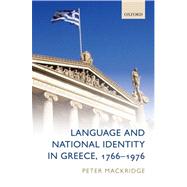Language and National Identity in Greece, 1766-1976
, by Mackridge, Peter- ISBN: 9780199214426 | 0199214425
- Cover: Hardcover
- Copyright: 7/15/2009
This is a history of the great language controversy that has occupied and empassioned Greeks - sometimes with fatal results - for over two hundred years. It begins in the late eighteenth-century when a group of Greek intellectuals sought to develop a new, Hellenic, national identity alongsidethe traditional identity supplied by Orthodox Christianity. The ensuing controversy focused on the language, fuelled on the one hand by a desire to develop a form of Greek that expressed the Greeks' relationship to the ancients, and on the other by the different groups' contrasting notions of whatthe national image so embodied should be. The purists wanted a writing system close to the ancient. The vernacularists - later known as demoticists - sought to match written language to spoken, claiming the latter to be the product of the unbroken development of Greek since the time of Homer. PeterMackridge explores the political, social, and linguistic causes and effects of the controversy in its many and passionate manifestations. Drawing on a wide range of evidence from literature, language, history, and anthropology, he traces its effects on spoken and written varieties of Greek and showsits impact on those in use today. He describes successive language-planning policies of the state and the efforts by linguistic elites to achieve language standardization and independence from languages, such as Turkish, Albanian, Vlach, and Slavonic, spoken where once Greek was dominant. This is a timely book. The sense of national and linguistic identity that has been inculcated into generations of Greeks since the start of the War of Independence in 1821 has, in the last 25 years, received blows from which it may not recover. Immigration from Eastern Europe and elsewhere hasintroduced new populations whose religions, languages, and cultures are transforming Greece into a country quite different from what it has been and to what it once aspired to be.







